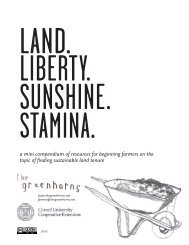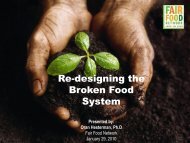I Believe in the Future of Farming[1] John Ikerd[2] I ... - Greenhorns
I Believe in the Future of Farming[1] John Ikerd[2] I ... - Greenhorns
I Believe in the Future of Farming[1] John Ikerd[2] I ... - Greenhorns
You also want an ePaper? Increase the reach of your titles
YUMPU automatically turns print PDFs into web optimized ePapers that Google loves.
contributors to greenhouse gasses and o<strong>the</strong>r pollutants which are threaten<strong>in</strong>g <strong>the</strong> ability <strong>of</strong><br />
<strong>the</strong> earth’s natural ecosystems to support human life.<br />
The only susta<strong>in</strong>able source <strong>of</strong> energy is solar energy. However, energy from all <strong>the</strong><br />
susta<strong>in</strong>able sources comb<strong>in</strong>ed – w<strong>in</strong>d, water, solar panels, bi<strong>of</strong>uels – will <strong>the</strong> less plentiful<br />
and far more costly than fossil energy. The days <strong>of</strong> cheap, abundant energy are over –<br />
period. Certa<strong>in</strong>ly, we can use energy more efficiently, but we simply cannot susta<strong>in</strong> <strong>the</strong><br />
economic growth rates <strong>of</strong> <strong>the</strong> <strong>in</strong>dustrial era. The <strong>in</strong>dustrial era was an aberration <strong>in</strong><br />
human history that is not likely to be repeated. We can’t cont<strong>in</strong>ue do<strong>in</strong>g what we are<br />
do<strong>in</strong>g. It is not susta<strong>in</strong>able. Change is no longer an option; it is an absolute necessity.<br />
That said, we will not make <strong>the</strong> changes we need until we have a clear idea <strong>of</strong><br />
someth<strong>in</strong>g better that we can change to. We need to create a new vision <strong>of</strong> a better future<br />
– a future beyond susta<strong>in</strong>ability. That new vision must beg<strong>in</strong> with <strong>the</strong> realization that we<br />
really don’t need more economic growth; we already have enough “stuff.” Ironically, <strong>the</strong><br />
most prom<strong>in</strong>ent economist <strong>of</strong> <strong>the</strong> 20 th century, <strong>John</strong> Maynard Keynes, anticipated <strong>the</strong><br />
current time <strong>of</strong> change back <strong>in</strong> <strong>the</strong> 1920s. He thought <strong>the</strong> economic problem would be<br />
solved with<strong>in</strong> a hundred years, which would be about now. He understood <strong>the</strong> economy<br />
as just a means <strong>of</strong> meet<strong>in</strong>g our basic material or tangible needs. He didn’t consider <strong>the</strong><br />
economic problem to be <strong>the</strong> permanent problem <strong>of</strong> humanity, but only a temporary<br />
problem that eventually would be solved.” [iii] To him, <strong>the</strong> permanent problem was to<br />
learn <strong>the</strong> “true art <strong>of</strong> liv<strong>in</strong>g,” to use our freedom from press<strong>in</strong>g economic concerns to<br />
learn to “live wisely and agreeably and well.”<br />
As it turned out, Keynes was actually too conservative. The “economic problem” <strong>in</strong><br />
America was solved as early as <strong>the</strong> 1960s. Various surveys and studies <strong>in</strong>dicate <strong>the</strong>re is<br />
been no <strong>in</strong>crease <strong>in</strong> overall well-be<strong>in</strong>g or happ<strong>in</strong>ess <strong>in</strong> <strong>the</strong> U.S. or <strong>the</strong> rest <strong>of</strong> <strong>the</strong> so called<br />
developed world s<strong>in</strong>ce <strong>the</strong> 1950s, <strong>in</strong> spite <strong>of</strong> cont<strong>in</strong>ued growth <strong>in</strong> wealth and <strong>the</strong><br />
consumption <strong>of</strong> “stuff.” [iv] Admittedly, many so-called “lesser-developed” countries <strong>of</strong><br />
<strong>the</strong> world still need to work on <strong>the</strong> temporary problem <strong>of</strong> economic growth. However,<br />
<strong>the</strong>y need not consume all <strong>of</strong> <strong>the</strong> earth’s rema<strong>in</strong><strong>in</strong>g natural resources <strong>in</strong> <strong>the</strong> process. First,<br />
<strong>the</strong> develop<strong>in</strong>g nations don’t need to expand <strong>the</strong>ir economies to match <strong>the</strong> American<br />
lifestyle. The research <strong>in</strong>dicates that beyond about $10,000-$15,000 GDP or <strong>in</strong>come per<br />
person – <strong>the</strong>re has been no relationship between fur<strong>the</strong>r economic growth and happ<strong>in</strong>ess<br />
or overall quality <strong>of</strong> life.<br />
People tend to be happier, regardless <strong>of</strong> <strong>the</strong>ir absolute level <strong>of</strong> <strong>in</strong>come, <strong>in</strong> nations that<br />
are more equitable, where <strong>the</strong>re is less disparity between <strong>the</strong> rich and poor,. [v] Develop<strong>in</strong>g<br />
countries can balance <strong>the</strong>ir modest needs for economic growth with <strong>the</strong> need to build<br />
more equitable and just societies, without compromis<strong>in</strong>g <strong>the</strong>ir future. Even unsusta<strong>in</strong>able<br />
population growth is much more a consequence <strong>of</strong> <strong>in</strong>security and <strong>in</strong>equity than <strong>of</strong> poverty<br />
or economic deprivation. Susta<strong>in</strong>able development may be slower and more difficult than<br />
<strong>in</strong>dustrial development, but <strong>in</strong> a world runn<strong>in</strong>g out <strong>of</strong> fossil energy, susta<strong>in</strong>able<br />
development is <strong>the</strong> only logical alternative for <strong>the</strong> future. There are more than enough<br />
resources on earth to meet <strong>the</strong> basic needs <strong>of</strong> people <strong>of</strong> both current and future<br />
generations <strong>in</strong> developed and develop<strong>in</strong>g countries, just not enough to susta<strong>in</strong> <strong>the</strong> levels


![I Believe in the Future of Farming[1] John Ikerd[2] I ... - Greenhorns](https://img.yumpu.com/38821670/3/500x640/i-believe-in-the-future-of-farming1-john-ikerd2-i-greenhorns.jpg)



